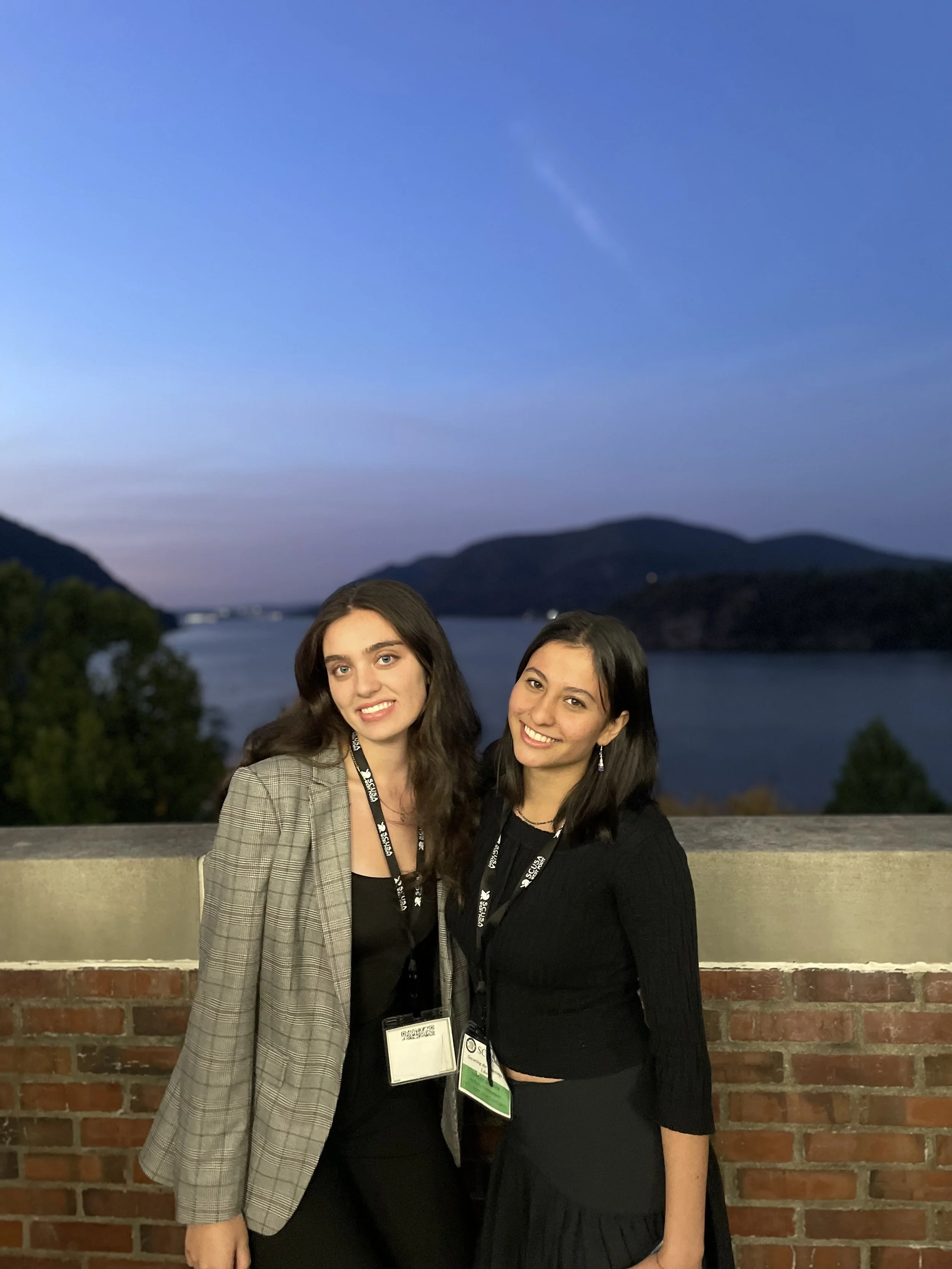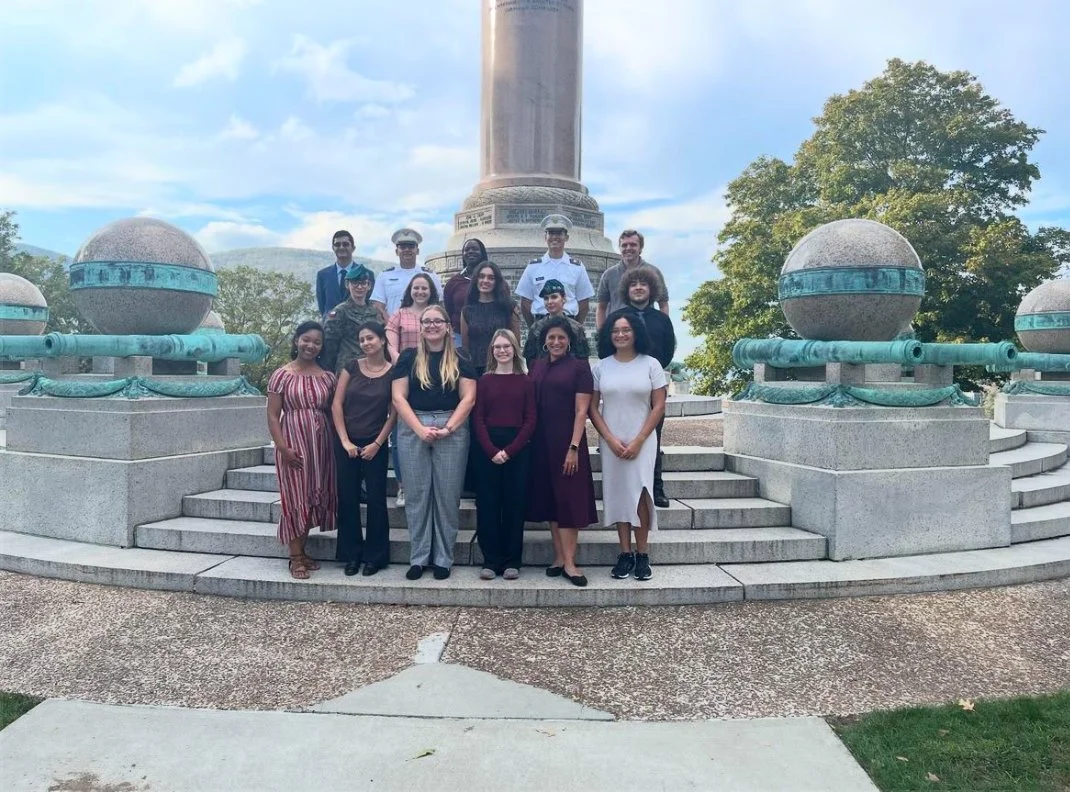By Brooke Spens
In early October, I had the privilege of attending The Class of 1971 Student Conference on U.S. Affairs (SCUSA) at the United States Military Academy. This year marked the 75th anniversary of the conference since its inception in 1949. From the beginning, SCUSA has provided a unique opportunity for collaboration between more than 200 students and scholars from around the globe to develop policy recommendations for the United States related to the year’s given theme. For 2024, the theme was “Securing the Blessings of Liberty: U.S. Foreign Policy in a Multipolar World.” Within this theme, there were 15 roundtables with topics. I was assigned to Table 12, “Latin America Under Pressures of Multipolarity.” Upon receiving our topics ahead of time, we were given readings to prepare for our roundtable discussions and assigned a cadet point of contact (CPOC) who was responsible for showing us around West Point and providing insight into the day-to-day as a cadet.
Sunset Overlooking the Hudson River
The first day of the conference was spent traveling to West Point. I landed at LaGuardia Airport and met other student delegates as we waited for our shuttle to arrive. After about a two hour drive up the Hudson Valley, we arrived at West Point. Our first tasks were checking in, collecting our swag bags, and attending a briefing on security procedures and an overview of the schedule. We were then escorted to a quick dinner at the West Point Club where more introductions were made as we networked with those in our roundtable group and cadets working to run the event. The last event of the evening was an opening panel discussion on the U.S. in a multipolar world moderated by the former U.S. Ambassador to NATO Douglas Lute. The panel members were The Honorable Douglas R. Bush, The Honorable Nazak Nikakhtar, Professor Daniel H. Nexon, and Professor Kathryn Sikkink. Their diverse perspectives and discussion provided a helpful preface to the conference theme. The day concluded by being escorted to the barracks where we met the cadets who had agreed to host us in their rooms. My hosts were two freshman athletes who were happy to talk about their experience so far and curious about how I thought it differed from a traditional college experience.
Following an early start to the morning and a family style breakfast in the mess hall with the over 4,000 cadets attending West Point, we made our way to the first roundtable session. Aside from the twelve student delegates, our table’s discussion was guided by two co-chairs with extensive experience relating to the Latin American region. Dr. Patrick J. Paterson is the Associate Dean for Research and Publications at the William J. Perry Center for Hemispheric Studies at the National Defense University with an expertise in national security affairs, foreign policy, and conflict resolution in Latin America. The second co-chair was Dr. Fabiana Sofia Perera, a senior faculty associate at the College of Strategic Security Cooperation at Defense Security Cooperation University specializing in security and defense issues relating to Latin America. They were invaluable for guiding our discussion. The first day included a session on international liberal order and the role of the US government in the current environment. After a working lunch, the second half of the day was spent defining the meaning of a multipolar world as it applies to Latin America with a focus on the presence of Russian and Chinese influence in the region. During our time conceptualizing potential issues within Latin America, I was able to provide insight into human rights concerns from research conducted during my time at the Tech4Humanity Lab, specifically freedom of the press in Mexico and El Salvador. Given the roundtable nature of the conference, it was wonderful to learn from the experiences and insights of my peers in the room.
Group photo at Trophy Point
The evening transitioned to the most formal event of SCUSA consisting of a keynote address and banquet. Following an outfit change into business attire, or dress uniforms for all military personnel, the address took place in Eisenhower Hall overlooking the Hudson River. The speaker was G. John Ikenberry, an Albert G. Milbank Professor of Politics and International Affairs at Princeton University and Co-Director of Princeton’s Center for International Security Studies. Among Professor Ikenberry’s accomplishments, he has authored seven books and 130 journal articles, essays, and book chapters. His remarks addressed the challenges of U.S. foreign policy in an increasingly multipolar world. It was an eye-opening speech on the positioning of the U.S. in today’s world, and a call to action to address the challenges beginning to unfold in the 21st century. The rest of the evening was a multi-course dinner in the Grand Ballroom before wrapping up with a delegate mixer at the Firstie Club where student delegates got to interact with cadets and other SCUSA participants while listening to live music.
On the second day of discussion, our roundtable reconvened to produce our ideas from the previous day into a tangible policy recommendation on our designated topic. We were tasked with drafting a policy memo on the subject of U.S. policy regarding Latin America, a considerable task. Our memorandum proposed domestic and international policies that address transnational challenges, internal instabilities, lack of critical infrastructure, and effects of climate change positioning the United States as the preferred partner of Latin America compared to near-peer adversaries. Other points of the memo included strategic analysis and options, recommendations, and implementation. Finally, we synthesized the information into a presentation to be briefed at the roundtable paper presentations session on the final day. In the afternoon our groups partook in a walking tour of West Point where we got to enjoy the landscape and take group pictures with iconic landmarks on campus such as Trophy Point while learning more about the history of the USMA. The day concluded with dinner in the mess hall and socializing in the Firstie Club before returning to the barracks.
The final day, all the SCUSA attendees gathered in the Riverside Cafe for final policy paper prep and breakfast. All the roundtable groups had the opportunity to showcase their work from the previous days in a ten-minute presentation. My group did a wonderful job presenting a glimpse of what we had discussed on U.S. policy in Latin America. Following closing remarks from Col. Heidi Demarest, the Head of the Department of Social Sciences at West Point, our group said our goodbyes and left West Point to travel to our departure destinations.
My main takeaways from SCUSA were the wonderful people I got to know over the four-day conference and the effort of the cadets to organize and host the event. The exposure to future officers in the U.S. army and the civilian-military collaboration to develop U.S. policy is something I will remember throughout my career. I cannot think of a more impactful experience to prepare me for entering a career with the federal government, and I am incredibly thankful to have had the opportunity to attend.



